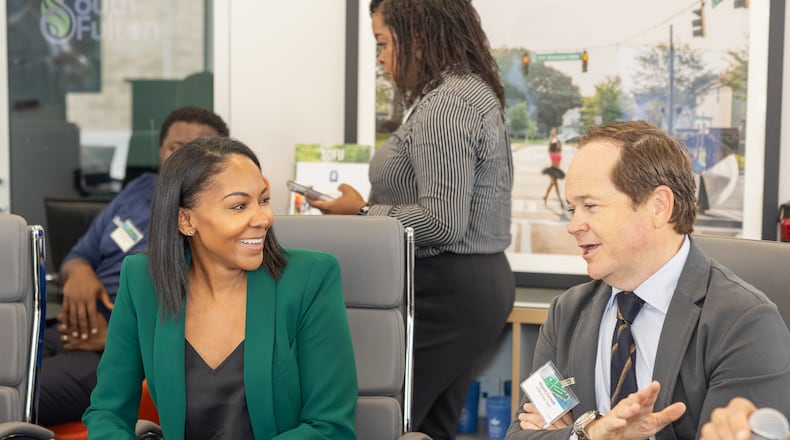Real estate brokers are wired to see potential whenever they gaze upon a vacant parking lot, shuttered big box store or expanse of trees along a highway.
But in some pockets of metro Atlanta, especially in majority Black communities south of I-20, those untapped sites often lie ignored.
T. Dallas Smith, the founder of one of the country’s largest Black-led commercial real estate firms, said those plots of land are ripe for new housing or mixed-use projects. In his view, there’s untapped potential — and profit — for brokers who shed preconceived notions about Atlanta’s Southside and focus on the oldest adage in real estate.
“The three most important things with real estate should be location, location, location,” said Smith, this year’s president of the Atlanta Commercial Board of Realtors. “But oftentimes, its complexion, complexion, complexion.”
Smith is helping lead a new initiative called the Great Sites Committee, which aims to find and showcase large tracts in overlooked areas. On Wednesday, he and the city of South Fulton took roughly a dozen seasoned brokers on a bus tour of four sites identified as potential hidden gems along Old National Highway, the city’s main thoroughfare.
Credit: Courtesy photo
Credit: Courtesy photo
Through a partnership with The Collaborative Firm, the brokers saw sites ranging from 14 acres to nearly 500 acres in a city whose leadership is eager for new investment.
Despite being home to more than 110,000 people, of which 92% are African American, South Fulton doesn’t have a building taller than four stories, according to Mayor Khalid Kamau. The city’s median household income is about $69,500, roughly the same of the city of Atlanta but about $15,000 less than the overall metro region, according to U.S. Census data.
“We are thinking about building up,” he said.
‘A fresh perspective’
South Fulton, a city incorporated in 2017, was awarded a grant last year to evaluate Old National Highway.
The grant was awarded by the Atlanta Regional Commission through its Livable Centers Initiative, which aims to identify potential sites for live-work-play developments and walkable infrastructure. The five-lane road was the obvious candidate, cutting through the most populated area of the city and leading to Hartsfield-Jackson International Airport.
It’s a stretch of concrete Smith knows well, because he grew up in the area.
Credit: special
Credit: special
He said he got his first job washing dishes at a Steak ‘n Shake off the highway, a location that’s since been replaced with a storage facility. The corridor was the place to be for restaurants at the time, he said.
“You name it, they were here,” he added.
He later worked at Richway, the discount division of the former Rich’s department store brand, and the vacant building is one of the four plots identified for re-development. The properties also include the unused parking lots of World Changers International Church, the dilapidated Camelot Condominiums and undeveloped forests near Pleasant Hill Road.
Dan Buyers, a partner at McWhiter Realty Partners and head of the Great Sites Committee, said there are long-held stigmas that south Atlanta can’t be home to high-quality developments that gain traction north of I-20. But he said showing brokers what is possible — and available for a fraction of the cost — should move the needle.
“Somebody from out of town will come into town and not have our predispositions, not have our prejudices, and they’ll say, ‘Why the hell is this still available?’” he said. “So sometimes, it takes an outsider to have a fresh perspective.”
An uphill battle
Areas like South Fulton that are begging for investment not only face challenges getting attention from developers, but they also have to overcome current economic headwinds.
The past year has been turbulent for commercial real estate as developers struggle to get projects financed, even in hot markets in Midtown and along the Beltline. High interest rates coupled with a tight lending environment have stalled several projects across metro Atlanta in recent months and commercial foreclosures loom.
Multiple brokers at the event said the city needed to temper expectations on how quickly these sites could be redeveloped, even if their locations and fundamentals jumped off the page. Sarah-Elizabeth Langford, the executive director of the Development Authority of Fulton County, which rebranded this week as Develop Fulton, said her agency is prepared to help developers.
Credit: special
Credit: special
“The incentive program at Fulton County was really designed for areas like this where developers are willing to make a large investment and maybe need some incentives or assistance,” she said.
Buyers said he expects the Great Sites Committee to expand its mission to other overlooked parts of the metro in the years to come, but is staying focused on South Fulton for now. More site tours are planned to continue showing the land to brokers in hopes of generating momentum, especially for new housing.
“Once you have that residential mass, the retail will follow,” he said.
Credit: special
Credit: special
Smith said it’s difficult to break decades of preconceptions. But promising real estate and discount prices should cut through any color barrier, he said.
“If you go to Midtown, land is trading at $18 million an acre,” Smith said. “We just passed land that is $160,000 an acre near the busiest airport in the world.”
About the Author
Keep Reading
The Latest
Featured








